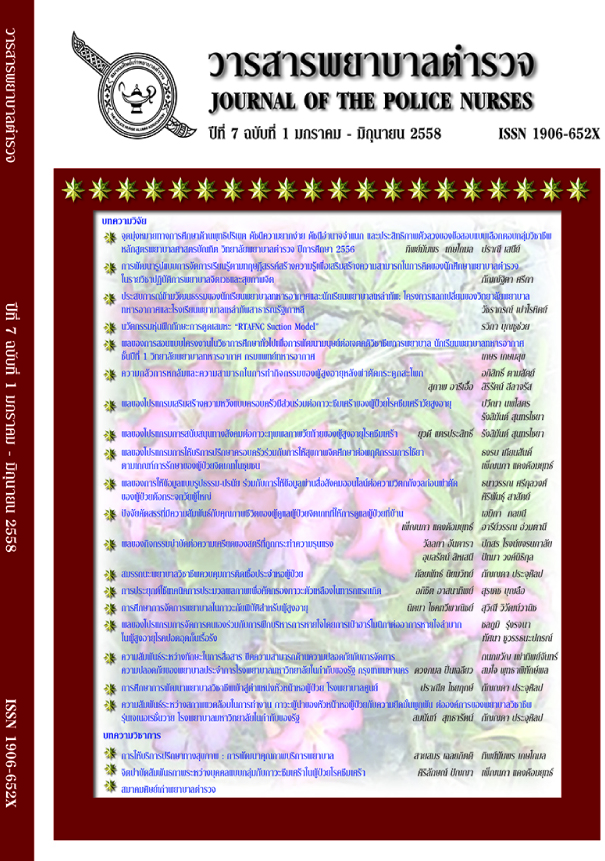จิตบำบัดสัมพันธภาพระหว่างบุคคลแบบกลุ่มกับภาวะซึมเศร้าในผู้ป่วยโรคซึมเศร้า
Keywords:
จิตบำบัดสัมพันธภาพระหว่างบุคคลแบบกลุ่ม, ภาวะซึมเศร้า, ผู้ป่วยโรคซึมเศร้า, Group interpersonal psychotherapy, Depression, Patients with depressive disorderAbstract
โรคซึมเศร้าเป็นโรคเรื้อรังเปน็ ปัญหาสุขภาพจิตที่สำคัญ ส่งผลกระทบต่อความคิด ต่อความรู้สึก อารมณ์และพฤติกรรมซึ่งส่งผลกระทบต่อชีวิตความเป็นอยู่ในทุกด้านหากซึมเศร้ารุนแรง การคิดและการตัดสินใจเชื่องช้า สมาธิไม่ดี และมีความคิดอยากตายและตามมาด้วยการฆ่าตัวตาย ปัจจัยที่มีผลต่อภาวะซึมเศร้ามีหลายปัจจัยได้แก่ ปัจจัยด้านส่วนตัวบุคคล ปัจจัยด้านจิตสังคม ปัจจัยทางพฤติกรรมและปัจจัยทางสัมพันธภาพและสังคม โดยเฉพาะปัจจัยที่เกี่ยวข้องกับปัญหาสัมพันธภาพและปัญหาสังคมเป็นตัวกระตุ้นให้เกิดโรคซึมเศร้าและเป็นปัจจัยที่ทำให้อาการของภาวะซึมเศร้าของผู้ป่วยนั้นคงอยู่ต่อไป หากได้รับการสนับสนุนทางสังคมและมีสัมพันธภาพที่ดีจะทำให้การจัดการกับปัญหาต่างๆ ช่วยบรรเทาผลกระทบจากภาวะอารมณ์ซึมเศร้า การใช้จิตบำบัดสัมพันธภาพระหว่างบุคคลแบบกลุ่มจะช่วยให้ผู้ป่วยได้มีการปรับเปลี่ยนความคิด อารมณ์และพฤติกรรมไปในทางที่เหมาะสมเน้นกระบวนกลุ่มการเกี่ยวกับการให้ข้อมูล การแก้ไขปัญหา การเผชิญปัญหาและการสนับสนุนทางสังคม มุ่งเน้นที่ปัญหาสัมพันธภาพระหว่างบุคคลที่เกี่ยวข้องกับโรคซึมเศร้า ซึ่งประกอบด้วย 1) อารมณ์โศกเศร้าจากการสูญเสีย 2) ความขัดแย้งทางบทบาทสัมพันธภาพระหว่างบุคคล 3) การเปลี่ยนผ่านบทบาท 4) ความบกพร่องทางสัมพันธภาพระหว่างบุคคล โดยที่ผู้รักษาจะเชื่อมโยงปัญหาสัมพันธภาพกับด้านใดด้านหนึ่งกับเทคนิคการรักษาเพื่อแก้ไขปัญหาสัมพันธภาพของผู้ป่วย จะส่งผลให้อาการซึมเศร้าของผู้ป่วยดีขึ้น
The Effect of Group Interpersonal Psychotherapy on Depression Among Patients with Depressive Disorder.
Abstract
Depression is a major mental health chronic problem. Depression affects to feelings, mood and behavior, which affects all aspects of everyday life. Severe depression can lead to poor concentration, slow thinking and decision making and is followed by thoughts of death and suicide. Factors contributing to depression, there are many factors such as personal factors, psychosocial factors, behavioral factors, social relationships. In particular, factors related to relationship problems and social problems as a stimulus to the depression and the factors that cause the symptoms of depression, the patient is still alive. If it has been a good relationship, social support, and make a deal with issues reduce the impact of depression. Interpersonal psychotherapy group will help patients have a change of thought.
Mood and behavior in a way appropriate to focus on the process of providing information. Coping and social support. Interpersonal psychotherapy group focus on interpersonal issues associated with depression. Which include 1) grief from losing 2) interpersonal role conflict 3) transitional role, 4) impaired interpersonal relationship. The treatment is associated with one side of the relationship with treatment techniques to resolve relationship problems of patients with depression that could improve symptoms of depression.
Downloads
Downloads
Published
How to Cite
Issue
Section
License
ผลงานที่ได้ตีพิมพ์แล้วจะเป็นลิขสิทธิ์ของวารสารพยาบาลตำรวจ



